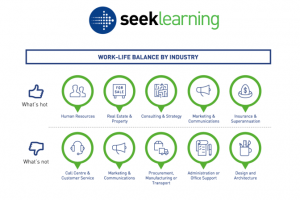A recent SEEK Learning report, which investigates the work-life balance status of industries across Australia, has found that Human Resource professionals rank their work-life balance as excellent or good, ahead of Real Estate and Property workers.

The SEEK Learning Defining Work-Life Balance Report also found that industries with the greatest number of workers who are unhappy with their work-life balance are Call Centres and Customer Service (19 per cent), Administration and Office Support, and those working in Procurement, Manufacturing and Transport (both 17 per cent).
According to the report, Marketing and Communications appears to polarise people, with over half of employees very happy with their work-life balance, sitting alongside 17 per cent of employees who rate it as poor or terrible.
“The report reveals there is not a one-size-fits all approach when defining work-life balance, and that definitions vary from person to person. When describing what work-life balance meant to them, Australian workers focussed on four different interpretations,” it says in the media release by SEEK Learning.
“Flexibility in work hours and location is cited by 34 per cent of people, and is particularly important for high-level employees and the self-employed; while work that doesn’t disrupt home life is cited by 27 per cent and is more important for women and those working part-time. The ability to time-bank (23 per cent) is important for men and those working full time or in mid-management; and no overtime (15 per cent) is key for entry-level employees.”
General Manager of SEEK Learning, Tony Barrett said the research highlights how the Australian workplace – and the needs of its workers – has evolved since the days of clocking on and off at set times.
“Over one in two Australians have changed jobs in search of better work-life balance during their career, with 70 per cent ultimately achieving it,” he said.
He advised workers thinking about changing careers in search of work-life balance to consider the role of education in the decision making process.
“Part of changing careers successfully is ensuring the desired industry or role offers the type of balance that is right for you. And of course, it is not as simple as just identifying the change you want to make, you also need to ensure that you have the right skills to transition to your new industry,” Mr Barrett added.
“This is where formal education can play a key role, or alternatively you may like to consider non-formal learning opportunities such as volunteering in your desired industry.”



















